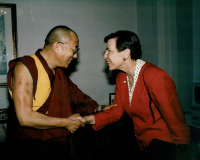Remembering Congresswoman Elizabeth Furse
Activism is an Amazing Life

Fraught political moments have become our day-today. The climate is ever more unstable. Our divides seem insurmountable. It’s moments like this that we look to our elders for guidance and comfort. Columbia Riverkeeper’s elder stateswoman and founding board member, Congresswoman Elizabeth Furse, was a model for the power of activism and the force of will required to help heal a small part of our world. She passed away in April at the age of 84 and we miss her dearly.
On Earth Day, April 22, 2000, Elizabeth announced the formation of Columbia Riverkeeper, a merging of two groups: Columbia River United and Clean Water Columbia.
“A couple of years ago Elizabeth told me she wanted to rejoin our board because Columbia Riverkeeper was all about action and getting things done,” said Brett VandenHeuvel, Executive Director. “She brought a fire, compassion, and deep political knowledge to our work. You had to be on your toes when Elizabeth was in the room.”
Elizabeth grew up in South Africa where she joined the antiapartheid movement at an early age. She eventually moved to California in the 1970s where she became involved in César Chávez’s United Farm Workers movement to unionize grape farm workers.
You must listen to people on the frontlines. César Chávez did that. He knew what a farmworker experiences… When I came to the Pacific Northwest, I drew on the lessons I learned in California and South Africa, and became intensely involved with the Tribal fishing rights struggle.
In Seattle, Elizabeth joined the fight for Tribal fishing rights. She met Billy Frank Jr., a tireless advocate for Indian Treaty Rights and environmental stewardship. She was deeply impressed by his dedication.
“He was arrested 51 times for exercising his Treaty fishing rights. I once looked at his resume and said, ‘Why weren’t you arrested during this four-year period?’ He said, ‘I was serving in the Marines.’ That stayed with me.”
Elizabeth moved to Portland where she dropped out of law school to help successfully lobby the U.S. government to recognize the Coquille, Klamath, Lower Umpqua, Coos, and Grand Ronde Tribes. She would go on to run for Congress and served three terms after which she did not seek reelection.
"This is a job that is really public service and not a career," Elizabeth explained.
Elizabeth is part of Riverkeeper’s DNA. It is our hope that we can distill her legacy of justice in all of our work. From saving salmon, to cleaning up Hanford, to engaging our communities, we believe in the power that organizing has to create a future we can only dream to imagine.


